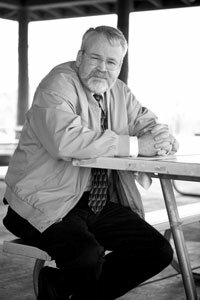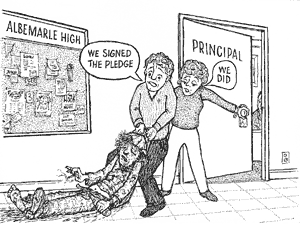NEWS- 'UVA proof': New law fixes FOIA loophole
Will Shaw went to the Supreme Court of Virginia to get UVA to comply with a Freedom of Information Act request. His suit was rejected– not because the material he asked for was exempt from FOIA, but because, he says, UVA claimed in court that it was not a state agency.
UVA denies his claim, and says the suit was rejected because Shaw filed it in the wrong venue– although his home county is the venue state code specifies for... state agencies.
As a result of this case, the Freedom of Information Advisory Council requested that the state code be revised to add the term "public body" to make the law "UVA proof," says Shaw. The General Assembly passed the law this session, and supporters fully expect Governor Tim Kaine to sign it.
The case started as a job-related request. Shaw, an associate director in facilities management at UVA, often hires workers for the physical plant at the Health System, and in the fall of 2005, he requested a UVA market salary survey for Central Virginia.
"In my area, we always have 40 vacancies for jobs such as painters, carpenters, HVAC... I thought it would be a useful tool when it's time to adjust salaries or make new hires," explains Shaw. "How can you make job offers not having a clue what the private sector offers?"
Once his request was denied, "It got more interesting," says Shaw. "I didn't immediately file a petition. I had to wrestle with it and risk the displeasure of my employer."
As a private citizen, he filed a FOIA request from home. It was denied, with UVA saying it was "proprietary information," he says. "In FOIA, proprietary is very carefully defined."
"It was exempt from disclosure," says UVA spokesperson Jeff Hanna.
FOIA experts disagree. "A salary survey applicable to a group of employees... to me, that would clearly be a public document," says state Senator Ed Houck, who's chairman of the FOI Advisory Council and whose district covers Louisa County, where Shaw resides.
"The salaries of public employees are open anyway," says Maria Everett, executive director of the FOI Advisory Council.
If the market salary survey is a consultant's report, "Who paid for it?" Everett asks. "Public money paid for it. If it's a consultant's report, there may be exemptions, but they have to cite those, and I never saw that response letter to Mr. Shaw."
Shaw filed an appeal to UVA's FOIA denial in Louisa Circuit Court, but the petition was never heard nor was the question of whether salary surveys are proprietary information ever argued.
"Judge [Timothy] Sanner reads the law out loud and asks UVA's attorney [Richard] Kast whether UVA is a state agency," relates Shaw. "He said, 'no.' Case dismissed. I about jumped out of my chair."
"UVA made no such argument," says UVA's Hanna. "Judge Sanner in Louisa ruled that the university was a public body and that the case therefore should not have been brought in Louisa, but rather in Charlottesville or Albemarle. Neither side raised this argument. The judge brought it up himself."
"UVA denied being a state agency," insists Shaw. "I heard it with my own ears." Kast did not return a phone call from the Hook.
State statute says that to petition "a local public body," the case must be filed in the city or county where the public body was elected or appointed.
"It was a totally absurd technical thing to try to get a dismissal," says Shaw. He appealed the decision, but the Supreme Court of Virginia refused his petition, finding no reversible error in Sanner's judgment. "Everyone was astonished by the second ruling," says Shaw. "It had the effect of making the University of Virginia not subject to the Freedom of Information Act."
Houck filed SB1003, which added "public institution of higher education" to the list of state agencies that may be appealed under FOIA in the general or district court of the locality where the aggrieved party lives.
"The bill really clarifies the venue," Houck says. "I think it's important because it removes any ambiguity about which court is the venue. If it's a state institution, it's either the district or circuit court of the constituent."
Shaw is still incredulous at the ruling– and at UVA's refusal to release the information he requested.
"My request had absolutely nothing to do with the living wage issue," he says. "I'm not sure why they've been so reluctant on this. I know various vocations are underpaid compared to the private sector, but UVA is not going to move to China, and its checks don't bounce. I don't understand why they're treating this like national security."
And as a taxpayer, he believes UVA has a obligation to disclose the survey. "Withholding it is unconscionable and inexplicable," he says. "A state agency cannot be permitted to behave like this."
The issue of how public UVA is will continue to be a hot topic as the school receives less and less funding from the state and more and more from private donors. Other legislation awaiting Kaine's signature takes information about UVA's private donors off a state auditing website because the endowment funds are not state funding.
Shaw estimates he spent between $2,000 and $3,000 taking the university to court, and he worries there will be repercussions. "I fear for my job," says Shaw, who's worked for UVA for 16 years. "I have been a very loyal, hardworking employee."
Is Shaw in danger of getting fired for taking UVA to court? "Of course not," says Hanna.
Shaw still does not have the market salary survey he requested almost two years ago, but he does plan to file another FOIA on July 1– the day the new law takes effect.

UVA facilities manager Will Shaw took his employer to court when it denied his Freedom of Information Act request. In the end, legislation was passed to close a loophole that let UVA dodge the request, but UVA says Shaw's job is not in danger as a result.
PHOTO BY WILL WALKER

#